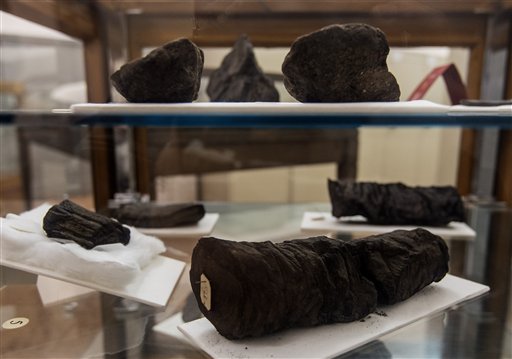
Artificial intelligence and two students from different parts of the world have successfully deciphered the first word from ancient scrolls that were preserved for almost 2,000 years after the eruption of Mount Vesuvius in AD79. These scrolls, discovered in the 18th century in a luxurious villa in Herculaneum, are considered “the only intact library to survive from Greco-Roman antiquity,” as mentioned in an article by Nature. The scrolls have become the focus of the Vesuvius Challenge, a competition offering cash prizes to individuals who can read the charred remains. Scholars launched the challenge in March, providing 3D X-ray images of two rolled-up scrolls and three papyrus fragments, along with untrained AI software that could interpret the scans, according to a report by Science Alert.
Luke Farritor, a computer science student at the University of Nebraska-Lincoln, and Youssef Nader, a biorobotics grad student at the Free University of Berlin, have been announced as the winners of the “first letters” prize. They independently identified the ancient Greek word “πορφυρας” or “porphyras,” which means “purple,” a color associated with wealth and status in ancient Rome. Stephen Parsons, a research adviser for the Vesuvius Challenge, tells the Guardian that this is the first recovered text from one of the intact scrolls. Farritor, who trained a machine learning model to identify subtle texture changes that could indicate ink, will receive a prize of $40,000, while Nader, who trained the model to identify letter-like shapes, will receive $10,000 for second place, as reported by Nature.
Researchers have made further progress in identifying more letters from the scrolls. Federica Nicolardi, a papyrologist at the University of Naples Federico II, states that three lines containing up to 10 letters are now discernible, as stated in the Guardian. This development increases hopes that the main $700,000 prize may be awarded before the December 31 deadline. The prize will be given to an individual who can read at least four passages from the scrolls, which are considered one of the most valuable sources of information about the ancient world. University of Kentucky computer scientist Brent Seales, one of the creators of the challenge, expresses his belief that the subject matter of this particular scroll will soon be revealed. He says to the Guardian, “An old, new story that starts for us with ‘purple’ is an incredible place to be.” (Read more Vesuvius stories.)
Denial of responsibility! Vigour Times is an automatic aggregator of Global media. In each content, the hyperlink to the primary source is specified. All trademarks belong to their rightful owners, and all materials to their authors. For any complaint, please reach us at – [email protected]. We will take necessary action within 24 hours.


